MOMENTUM UPDATEFROM THE DESK OF DR. MICHAEL JOHNS CHIEF EXECUTIVE OFFICER OF THE ROBERT W. WOODRUFF HEALTH SCIENCES CENTER |

June 2007
Table of Contents:
- Realizing Vision 2012
- Emory Acquires Supercomputer Capabilities
- Research Highlight: New Genetic Clues to Schizophrenia
- Invented Here: The Next Step in Translational Nanotechnology
- Taking the Lead: National Bipartisan Coalition on Chronic Disease
- Keep Up with the Latest in Research News
- Honors, Recruitments, and Appointments
- Upcoming Noteworthy Events
- Emory Baseball Team Finishes Second in the Nation in Division III - A Leadership Lesson
-
Jeffrey Boatright, PhD, was elected to a five-year term as a trustee for the Biochemistry and Molecular Biology section of the Association for Research in Vision and Ophthalmology. His research focus at Emory is endogenous DNA repair mechanisms.
-
Woodruff Health Sciences Center faculty were winners in five of six categories in this year's Atlanta Business Chronicle's Health Care Heroes awards: (1) Susan Allen, MD, Rollins School of Public Health, Community Outreach Hero Award, for her work in decreasing HIV transmission in Rwanda and Zambia; (2) Lynn Sibley, RN, PhD, Nell Hodgson Woodruff School of Nursing, Allied Health Professional Hero Award, for her work in reducing mother-infant mortality during childbirth in developing countries; (3) Otis Brawley, MD, 2004 Woodruff Leadership Academy Fellow, Winship Cancer Institute, Military Service Hero Award, for his work in directing an urgent care center in Katrina-ravaged New Orleans; (4) Jeffrey Salomone, MD, School of Medicine, Physician Hero Award, for his work as a trauma surgeon at Grady; and (5) Amy Dunn, MD, School of Medicine, and Children's Healthcare of Atlanta, along with Michael Busch, MD, of Children's Healthcare, Health Care Innovations Hero Award, for their work in pioneering a new surgical technique in treating hemophilia patients. Award finalists from WHSC included Owen Samuels, MD, School of Medicine, Physician Hero Finalist, for his work in designing Emory’s new neurointensive care unit and Leonard Howell, PhD, Yerkes National Primate Research Center, Health Care Innovations Finalist, for his research aimed at combating drug addiction. I am very proud of this fine group of faculty as representatives of the many heroes in health care in the WHSC.
-
Fifteen RNs throughout Emory Healthcare received the DAISY award, a national program sponsored by the DAISY Foundation that recognizes extraordinarily compassionate nursing care. DAISY stands for “diseases affecting the immune system." Nominated by a combination of patients and colleagues, the honorees include the following: Lakeysha Daniels, Shirley Johnson, Melanie O’Brien, and Jeffrey Sherrill (Emory Crawford Long Hospital); William Bodner, Clordette Hester, Florence Manga-Sheriff, Gena Mayhew, and Beth Ryan (Emory University Hospital); Kelly Carr and Mary Reinhart (The Emory Clinic); and Iz Asoro, Regina Hayes, Gary Purtymun, and Lisa Snyder (Wesley Woods Center).
-
The Emory Healthcare Marketing Department received five “Aster” awards for excellence in medical marketing for promotion campaigns/materials for the following: Emory Heart Center (gold), Emory Crawford Long Hospital (silver), Emory Flight (silver), Plastic Surgery (bronze), and Step Up Emory (bronze).
 I want to express my gratitude to everyone that attended the Vision 2012 Update talk last Wednesday. The standing-room only crowd in the auditorium of the Woodruff Health Sciences Center Administration Building heard updates on goals met and our plans to meet the objectives of Vision 2012: Transforming Health and Healing. The plan’s aim: to establish Emory’s eminence in patient-centered, research-driven, collaborative health care. I want to share some highlights of the talk.
I want to express my gratitude to everyone that attended the Vision 2012 Update talk last Wednesday. The standing-room only crowd in the auditorium of the Woodruff Health Sciences Center Administration Building heard updates on goals met and our plans to meet the objectives of Vision 2012: Transforming Health and Healing. The plan’s aim: to establish Emory’s eminence in patient-centered, research-driven, collaborative health care. I want to share some highlights of the talk.
One of the most important areas of advancement involves the development of clinical and translational Centers of Excellence, including the Emory Transplant Center, the Emory Heart and Vascular Center, the Emory Comprehensive Neuroscience Center, the Emory Center for Respiratory Health, and the Winship Cancer Institute. Each of these centers has begun recruiting additional world-class scientists, clinicians, and administrators who understand and embrace the goal of leading the integration and transformation of truly patient-centered care.
I also noted the growth in research support in the WHSC from $133 million to more than $330 million over the past 10 years. In the School of Medicine alone, NIH research funding during that period grew from $55 million to more than $190 million, moving from a national ranking of 31 to 18. That is a big "wow!"
In order to meet the growing need for research infrastructure, approximately 600,000 square feet of new space distributed over three locations, including Midtown, will be added to the 700,000 square feet already added over the past decade. I can’t emphasize enough how important it is to continue to grow our research enterprise as we’ve done over the past 10 years or so.
I also announced the upcoming opening of the Emory Center for Health Discovery and Well-Being on our Midtown campus. The center, a conceptually and architecturally innovative preventive care facility, which is the cornerstone of our Predictive Health Initiative, is aimed at helping people maintain their health. The center’s opening will mark the beginning of an exciting transformation of Midtown Atlanta that eventually will include research, clinical, and administrative space in addition to retail and residential venues.
In my talk, I further highlighted one of the biggest developments since last year, the commitment by the Woodruff Foundation of $240 million to the construction of a new Emory Clinic. This is an extraordinary gift and an enormous contribution toward realizing the future we are determined to create.
If you would like to view this talk in its entirety, it is available on the WHSC home page at http://www.whsc.emory.edu.
Emory Acquires Supercomputer Capabilities
Emory has acquired a high-performance computational core cluster, which will place the University in the top echelon of the world’s most powerful supercomputing sites. This 1,024-CPU cluster will allow Emory researchers to accomplish experiments using simulations that would be impractical or too costly using conventional laboratory methods, according to Richard Mendola, PhD, Vice President for Information Technology. Researchers previously had the option of investing in small-scale hardware and creating and managing their own clusters, using one of Emory’s smaller, general-purpose clusters, or obtaining grant support to access a national supercomputer center. The new cluster helps bridge the gap between these existing options at Emory and the high-end national supercomputer clusters.
Initially, the University will offer researchers complimentary computer time to help them familiarize themselves with the new cluster. After that, subscriptions will be priced so that the cost to faculty will be cheaper than buying their own hardware or leasing it.
Research Highlight: New Genetic Clues to Schizophrenia
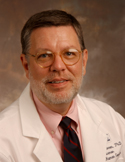 One of the research groups that will use the new high-performance computer cluster described above is led by Stephen Warren, PhD, Chair of Human Genetics. Dr. Warren's group will test schizophrenia patients for a recently discovered variation in the human genome. This project just received $3.5 million from the National Institute of Mental Health. The new variation in the human genome is called “copy number variation,” or CNV. Every individual may carry as many as 100 CNVs. While CNVs do not cause disease on their own, in combination with other genetic changes and/or environmental factors they may contribute to one’s overall disease risk. The Emory project will screen 500 schizophrenia patients and 500 controls for CNV throughout the entire human genome.
One of the research groups that will use the new high-performance computer cluster described above is led by Stephen Warren, PhD, Chair of Human Genetics. Dr. Warren's group will test schizophrenia patients for a recently discovered variation in the human genome. This project just received $3.5 million from the National Institute of Mental Health. The new variation in the human genome is called “copy number variation,” or CNV. Every individual may carry as many as 100 CNVs. While CNVs do not cause disease on their own, in combination with other genetic changes and/or environmental factors they may contribute to one’s overall disease risk. The Emory project will screen 500 schizophrenia patients and 500 controls for CNV throughout the entire human genome.
Invented Here: The Next Step in Translational Nanotechnology
Researchers in biomedical engineering have developed new clinical protocols detailing how to prepare, process, and quantify quantum dots (luminescent nanoparticles linked to biologic molecules) to give laboratory physicians the information they need to use these nanoparticles to track biomarkers of cancer in cells and tissue. The new research guidelines were published in the May 3 issue of Nature Protocols, available at http://natureprotocols.com.
The technology they describe is a variation of immunohistochemistry, the laboratory staining process commonly used by pathologists to identify proteins in a tissue section from a cancer patient. The protocols for using the technology include antibody conjugation, preparation of tissue specimens, multicolor quantum staining, image processing, and biomarker quantification.
Quantum dots have advantages over traditional dyes and stains often used in imaging — they are more brightly fluorescent, they resist photo bleaching, and they can emit a broad range of colors simultaneously. They are particularly important for detecting cancer biomarkers that are present at low concentrations or in small numbers of cells.
The team was led by researchers Shuming Nie and May Dongmei Wang and included cancer researchers Leland Chung, Ruth O’Regan, and John Petros.
Taking the Lead: National Bipartisan Coalition on Chronic Disease
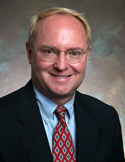 Last month, Kenneth Thorpe, PhD, Chair of Health Policy and Management in the Rollins School of Public Health, helped launch the Partnership to Fight Chronic Disease (PFCD), in collaboration with former U.S. Surgeon General Richard Carmona and other leaders gathered in Washington, D.C. Thorpe and Carmona will co-lead the coalition, a team of health care, business, and labor community experts and organizations committed to positioning chronic disease care as a key health care issue in the 2008 U.S. presidential election. Along with other policy experts, including Mark McClellan, MD, former administrator of the Centers for Medicare and Medicaid Services, Thorpe announced a broad-based effort to change the way this country approaches chronic disease, which accounts for 75% of the $2 trillion spent each year on health care. During an event to kick off the coalition, Thorpe and McClellan delivered a keynote presentation, “An Unhealthy Truth,” describing the scope of the problem, including the fact that 30% of the increase in health care spending since 1987 is due to the doubling of the rate of obesity during that time.
Last month, Kenneth Thorpe, PhD, Chair of Health Policy and Management in the Rollins School of Public Health, helped launch the Partnership to Fight Chronic Disease (PFCD), in collaboration with former U.S. Surgeon General Richard Carmona and other leaders gathered in Washington, D.C. Thorpe and Carmona will co-lead the coalition, a team of health care, business, and labor community experts and organizations committed to positioning chronic disease care as a key health care issue in the 2008 U.S. presidential election. Along with other policy experts, including Mark McClellan, MD, former administrator of the Centers for Medicare and Medicaid Services, Thorpe announced a broad-based effort to change the way this country approaches chronic disease, which accounts for 75% of the $2 trillion spent each year on health care. During an event to kick off the coalition, Thorpe and McClellan delivered a keynote presentation, “An Unhealthy Truth,” describing the scope of the problem, including the fact that 30% of the increase in health care spending since 1987 is due to the doubling of the rate of obesity during that time.
Keep Up with the Latest in Research News
I strongly recommend that anyone involved in research administration at Emory review each issue of a new monthly newsletter, Research Administration News at Emory, which includes upcoming developments that impact the Emory research community. All issues are available online, and emails announcing new issues are sent to those subscribing to the Research Administration Announcement listserv. You may view archived issues and sign up to receive emails at http://www.osp.emory.edu.
Honors, Recruitments, and Appointments
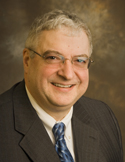 |
Albert Blackwelder, Chief Operating Officer of Emory Crawford Long Hospital (ECLH), has been named COO of Wesley Woods Center (WWC), a role in which he has served in an interim capacity since January of this year. He has served as COO of ECLH since 1994 and will continue as interim COO there until a new COO is named. Mr. Blackwelder has been with ECLH since 1975, and his deep knowledge of Emory Healthcare and of the many components of WWC will be invaluable in his new role. In addition to a 100-bed hospital serving 30,000 older adults and chronically ill patients each year, WWC includes 18 long-term, acute care beds, a 25-bed inpatient hospice unit (in conjunction with VistaCare), a 250-bed skilled nursing care facility (Budd Terrace), and a 201-unit independent living facility with one floor of assisted living. WWC also includes management of Wesley Woods Senior Living, Inc, which owns and manages seven senior living facilities in North Georgia through its affiliate corporations. |
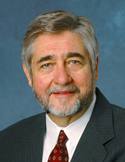 |
Edward Craighead, PhD, is a recent recruit to the Comprehensive Neuroscience Center, where he leads a new clinical service, the Child and Adolescent Mood Disorders Program. Dr. Craighead is also the first Rex Fuqua Chair in Child Psychiatry. He came to Emory from the University of Colorado, where he chaired the psychology department (leading it to a top 10 national ranking in research funding) and where he co-directed a treatment center for bipolar disorder. For the past several years, he also co-directed a clinical research program in Iceland to prevent initial episodes of depression among adolescents. |
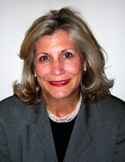 |
Susan Cruse has been appointed Senior Vice President for Development and Alumni Relations for the University, effective July 1. She is currently Associate Vice President for Development and Alumni Relations for Johns Hopkins Medicine. Since 1991, Cruse has worked in senior fund-raising positions at UCLA, UC-Irvine, and Johns Hopkins, with the exception of a two-year stint as director of university alliances for the global corporation TRW, Inc. During her four years at Johns Hopkins, Cruse helped develop and manage operations for the $2 billion Hopkins Medicine campaign. |
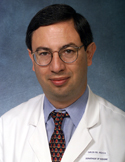 |
The University has honored Carlos del Rio, MD, with the Marion V. Creekmore Award for Internationalization for his work in advancing Emory’s commitment to global health education and research. An infectious disease specialist, Dr. del Rio is Vice Chair for Grady Affairs in the Department of Medicine, and he directs clinical sciences and international research for the Emory Center for AIDS Research as well as the Emory AIDS International Training and Research Program. |
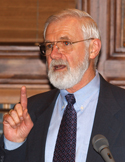 |
William H. Foege, MD, Presidential Distinguished Scholar and Professor Emeritus in the Rollins School of Public Health and a fellow with the Bill and Melinda Gates Foundation's Global Health Program, has received two recent honors, the Lautenberg Award and the Stephen Smith Award for Lifetime Achievement. The Lautenberg Award, from the University of New Jersey Medical and Dental School, honored his contributions in public health, as did the Smith Award, given by the New York Academy of Medicine. |
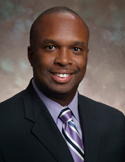 |
Leon Haley, MD, Deputy Chief of Staff and Deputy Senior Vice President of Medical Affairs for the Grady Health System and a 2005 Woodruff Leadership Academy Fellow, has been appointed to the Georgia Trauma Care Network Commission by Lieutenant Governor Casey Cagle. The commission, which is comprised of a nine member panel, will work to ensure that all Georgians have access to trauma care. |
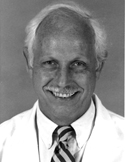 |
Robert Hatcher, MD, of the Department of Gynecology - Obstetrics, received the Kenneth J. Ryan, MD, Physician Leadership Award at the annual meeting of the American College of Obstetricians and Gynecologists in May. Physicians for Reproductive Choice and Health gave him this award based on his work over more than four decades in education about contraception. |
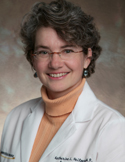 |
Katherine Heilpern, MD, Acting Chair of the Department of Emergency Medicine and a 2004 Woodruff Leadership Academy Fellow, has been named President-Elect of the Society for Academic Emergency Medicine. The mission of this 5,700 member society is to improve patient care by advancing research and education in emergency medicine. These advances will promote ready access to quality emergency care for all patients, promote emergency medicine as an academic and clinical discipline, and set the highest professional standards for emergency healthcare providers across the continuum of clinical care, research and education. |
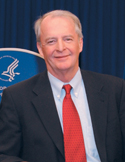 |
James Hughes, MD, a faculty member with dual appointments in public health and medicine and who serves as Director of Global Infectious Diseases, received the Gen-Probe Joseph Award from the American Society for Microbiology for his career accomplishments in public health and medicine. Before coming to Emory, Dr. Hughes spent more than three decades at the CDC. Under his leadership at the National Center for Infectious Diseases, the country developed a strategy for dealing with emerging and reemerging diseases, and he led the frontline response to the SARS outbreak. |
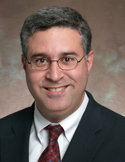 |
Fadlo Khuri, MD, Deputy Director for Clinical and Translational Research at the Winship Cancer Institute and a 2003 Woodruff Leadership Academy Fellow, has been elected to the American Society of Clinical Investigation (ASCI). Each year, ASCI members nominate those who have made significant contributions in their careers at a relatively early age (45 or younger). Last year, Dr. Khuri’s translational research was recognized with a National Cancer Institute grant of $7.9 million for the study of cell signaling to enhance therapy for lung cancer. |
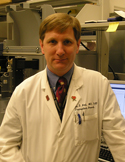 |
Allen Kirk, MD, PhD, arrived last month to assume his post as the new research director of the Emory Transplant Center. A kidney and pancreas transplant surgeon, Dr. Kirk came to Emory from the NIH, where he was a senior investigator and the founding chief of the Transplantation Branch. He is recognized internationally for his expertise in transplant tolerance and translational clinical trials. Dr. Kirk also holds an appointment in pediatrics to facilitate novel transplant therapies for children. |
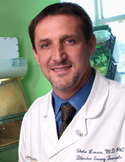 |
Christian Larsen, MD, founding director of the Emory Transplant Center and a 2003 Woodruff Leadership Academy Fellow, received the 2007 Thomas E. Starzl Prize in Surgery and Immunology at the University of Pittsburgh School of Medicine, where he gave a lecture on the current focus of his research: achieving true immune tolerance for organ and tissue transplants. |
Emory Healthcare and the Woodruff Health Sciences Center are sponsors of The Design Prescription, an exhibition at the Museum of Design Atlanta that examines Atlanta’s built environment from the health care perspective, and engages talented designers to provide possible solutions or alternative prescriptions for our city. It is a unique exhibit that aims to educate the broader public on the possibilities of design and how it can influence our lifestyles and overall health. This is one of the first exhibitions in the country to address this growing field of study. The Museum of Design Atlanta is located in the Marquis II Tower at 285 Peachtree Street and admission is free. This exhibit runs from June 7 – August 11, 2007. For more information, visit www.museumofdesign.org.
Emory Baseball Team Finishes Second in the Nation in Division III - A Leadership Lesson
As you know, I enjoy reporting accomplishments of our Emory students, and this month I am especially proud to report that the Emory Baseball Team finished the year ranked second in the nation in NCAA Division III. They lost a 5-4 heartbreaker in extra innings in the championship game. The second-place national finish is the best in the history of Emory baseball.
While that in itself is a superb accomplishment, there is more to the story. In the opening game of the national championship tournament, Emory lost 2-0. It would have been very easy for the Eagles to become frustrated and disappointed, but instead they resolved to play harder the next day, and the next, and the next. They won four consecutive games to make it to the national championship game. Remember I said they lost in the first game 2-0? The Eagles beat that same team 18-7 to advance to the final game. Now that is what I call a major turnaround!
While we salute them for the outstanding season, it is also important to acknowledge them for never giving up when things mattered the most. There is a lesson there that all of us can use. We often find ourselves in a situation of having our backs to the wall like the Emory baseball team. We have to dig deep and find the resolve and energy to get things done, and to remain positive in the face of adversity. We will never “win every single game in life,” but it is the effort we give and the resolve we maintain that makes us winners.
I appreciate the way that all of you across the Woodruff Health Sciences Center resolve to do the best you can, each and every day, regardless of the situation. Our health sciences center is definitely a winner, and you are the reason why!
Sincerely,
Michael M.E. Johns, MD
CEO, Woodruff Health Sciences Center